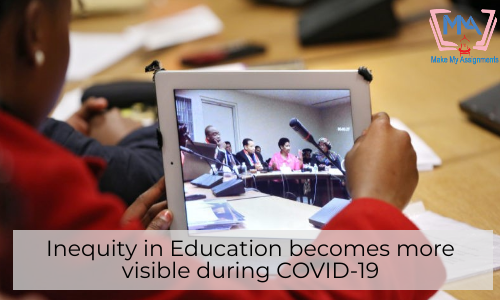
Inequity in Education becomes more visible during COVID-19
As we all know that due to the rise of COVID-19, educational classes have been shifted to various online platforms, clearly reflecting the gap between students and the available resources. It is either with or without resources; the gap has still widened, making inequity more visible. Seeing the remarkable shift of education to online learning platforms has obviously created a major impact on the overall educational system.
Students from marginalized families and the ones witnessing racial violence for a very long time have been further facing more hardships during this tough time period, and COVID-19 has been said to threaten their lives and livelihoods to a larger extent. It is not just the well-being or lives of people; education as well has been quite tough for them during this period.
For instance, higher education has not been said to be that immune to the inequities created by the pandemic. This could further be witnessed by the decreased enrolment of undergraduate students this year, especially the ones who belong to marginalized groups. Students across the globe from lower classes, marginalized sections and poverty-stricken families have been suffering a lot due to the pandemic.
Academic Integrity
So far, academic integrity has been compromised due to the online learning platforms and the new culture brought to education. We cannot simply deny the rise of contract cheating or sharing of academic files. The most common one is the exam cheating concept that has been the most problematic issue of this new learning environment. Due to the fact that learning today has become mostly remote and it is easier for students to resort to online learning platforms, cheating has become far more easier for them. It is also observed that there is no remorse on the part of students since attitudes have changed from prioritizing education over other things.
School education was more of student-teacher interaction, where teachers used to resolve every silly question of students and brought them out of every single misery they faced while learning. And since we have witnessed the lack of student-teacher interaction during the pandemic, students are seen to be less passionate about the integrity of their work. This often leaves students with half-completed assignments and work, get answers from their fellow classmates or friends, or turn towards the nothing aspect, which simply explains how education has become less important due to COVID-19.
Consequences of school closures
Shifting towards the online learning environment has shed light on numerous academic and social issues affecting access to education that came in the wake because of the widespread school closure. The disruptions caused in learning due to the shift from traditional learning methods have affected the lives of people across communities, but this impact is even more severe for the students who belong to disadvantaged communities. The things that have been affected so far include their compromised nutrition, interrupted learning, high social and economic costs, and childcare problems for the families who have no means to work. The academic performance of students hinges critically as they are not able to maintain close relationships with their teachers and other learning processes. It is not just true for students who come from disadvantaged communities but also for the ones who belong to lower-middle-class families who are not able to share the same level of parental support which they need to own for themselves.
Unequal access to technology
Lack of resources or, say, unequal access to technology has been preventing students from rural areas from establishing stable internet access for learning. For instance, the lack of good internet connectivity has acted as a hurdle in the process of continued learning, especially for students who belong to poor families.
Now that we all know about the inequities that exist in the educational system, which have been more visible due to COVID-19, we wish to see that government soon redress this issue and create awareness among people about its growing disparities and true reality. And this could only be done with the help of continued attention and collective action from people across the globe.




